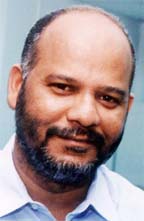Home Minister Clement Rohee has professed ignorance of a project to install cameras at police stations to monitor interrogations and prevent torture, which Foreign Minister Carolyn Rodrigues-Birkett detailed to a Human Rights Council in Geneva recently.

Answering questions relating to the saga of the teenage murder suspect whose groin area was burned severely while he was being questioned by police at the Leonora police station, Rodrigues-Birkett had said that security cameras were being installed at police stations here to monitor interrogation techniques so as to prevent a repeat of the tortured teen saga.
However, responding to questions by this newspaper following a recent press conference, Rohee said he was unaware of such a programme.
Rohee acknowledged that there is a project ongoing that was initiated by his ministry to install cameras at a number of police stations. This arose out of concerns that “police stations had to barricade themselves in, were closing up after a certain hour and other kinds of hanky panky business were going on at a number of police stations such as money going missing and things going missing from the property room.”
He said persons were attacking police stations, and these attacks included drive-by shootings, but there would be no evidence as to the identity of the perpetrators.
Rohee said that when people shoot at or throw a grenade at the station then, “We have to resort to technology,” hence the decision to start the project.
He told this newspaper that the project was ongoing and would go as far as the budget would allow. “It has nothing, if I may emphasize, to do with recording what you just said…” he added.
He stressed again that he had no knowledge of cameras being installed to monitor interrogation techniques, adding that he just spoke on the issue in general.
Rodrigues-Birkett, addressing questions on the torture of the teen, Twyon Thomas, while he was in police custody told the UN Council, “… proper leadership and supervision at all levels of the police force particularly at the station precinct level, coupled with the installation of security cameras, will monitor police interrogation methods so that such cases as that of Twyon Thomas will be stopped.”
Meanwhile co-president of the Guyana Human Rights Association (GHRA) Mike McCormack and Thomas’s attorney Khemraj Ramjattan both expressed support for such a venture being undertaken.
McCormack told Stabroek News that the idea is encouraging but expressed the belief that the installation of such devices will not prevent excessive use of force. He said that this will be inadequate given the culture of members of the Guyana Police Force who would use force during interrogation.
McCormack added that if such a system were to work effectively, cameras needed to be strategically placed to view all areas of the police station and the recordings would have to be reviewed regularly. “It is welcome but inadequate,” he said.
According to Ramjattan, the Bar Association had been calling for cameras in police stations for years, as persons had been complaining about police behaviour during questioning. He said this was something he would support.
He said the recordings on these cameras would help judges in cases of alleged police brutality and injustice.
Ramjattan pointed out that while it may be costly to have them all over the station, this was preferred.
The police are being sued for a minimum of $40 million for the trauma and physical damage the teen sustained as a result of the ordeal. After being taken into custody in connection with a murder investigation late last year, the teen was stripped and beaten before being burnt in his genital area at the Leonora Police Station. He was subsequently seen by Dr Mahendra Chand, although he had a bag over his head.
Three policemen have since been charged with unlawfully wounding the child, as well as in connection with the beatings meted out to two other men who were being investigated for the same murder.
Dr Chand’s treatment of the boy has been severely criticized by many, including the GHRA, which accused him of ignoring the abuse of the boy and called for him to be relieved of his duties in the police force and prison service.
